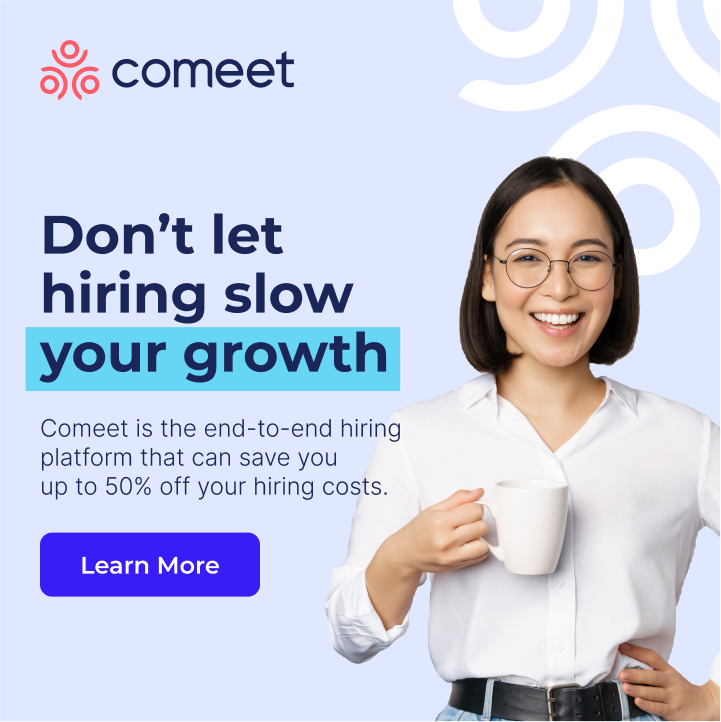Where do you see the future of work heading and what are the predictions for talent acquisition? In many ways, it’s already here. Whether its new tools or economic forecasts, recruiting and human resource professionals have to stay informed about emerging trends and patterns in the workplace in 2023. Failure to do this could lead to you falling behind in your efforts to recruit and retain top talent for your organization.
Whether it’s automated processes, artificial intelligence (AI), machine learning (ML), remote work, or the very nature of how we accomplish tasks, companies find themselves having to adapt to a new ecosystem. From a talent acquisition perspective, this means being able to implement new technologies, working styles, and strategies to best appeal to candidates while also being successful.
In this post, we’ll explore where we think the future of work is headed and what that means for your talent acquisition efforts. We’ll also outline strategies HR, and recruiting professionals can use to thrive in this ever-changing landscape. Whether you’re a seasoned vet or new to the field of recruitment, you’ll find valuable insights for succeeding in the future of work.
Predictions for Talent Acquisition and the future of work
The first place to start when looking at the future of work is in the area of AI/ML technology and automation to help get work done more efficiently. As technology continues to develop rapidly, machines will do more work. Every business has both strategic and operational needs. The goal of employing more AI/ML technology is to allow the humans in the organization to focus on strategy and execution. At the same time, machines complete the more mundane, repeatable operational tasks.
This will also lead to a seismic shift in the very nature of work tasks. Automation will replace many positions, but other roles will spring up in their place that requires newly developed skills. One example is in the area of data science: as AI becomes increasingly more popular to use, there will be an increased need for engineers and data analysts who know how to read the data produced.
Additionally, as the economy moves toward a more digital posture, the need for operators with digital marketing and online communication skills will also increase. One area in which this is prevalent is e-commerce. Imagine someone in the retail space 20 years ago. They’d likely work at a physical store. With the rise of online shopping, every retail outlet has an online presence which requires digital skills to operate.
Finally, remote work is another aspect of the modern workplace that continues to change. The COVID-19 pandemic forced many knowledge workers into their basements and spare bedrooms, leading to the rise of the home office. While it’s true that many companies are bringing employees back into the office, slowly but surely, some take more time to do so. Rising commercial real estate costs and higher employee satisfaction are two very compelling reasons for businesses to embrace remote work for the long haul.
From an organizational standpoint, remote work is no longer viewed as a perk by some but as a necessity for forward-thinking companies. That will impact how businesses recruit in the future. They’ll likely have no choice but to be open to remote or hybrid setups to attract the most talented workers who don’t require a physical, in-office presence.
Overall, AI, automation, and remote work are significant trends that will continue to grow in importance in 2023 and beyond. But what does that mean for your recruitment? Certainly, you’ll need to be aware of these developments. But you’ll also want to adapt your talent acquisition strategy to ensure you align with them.
How will this shape talent acquisition in the future
As a recruiter or human resources professional, how can you tap into these trends to make talent acquisition more effortless and effective?
First, AI is impacting every industry and the way they work. Recruiters and human resource departments should use this technology like any other business. Below are just a few ways in which AI can inform your talent acquisition efforts:
- Sourcing. Finding candidates used to feel like locating a needle in a haystack. Now you can comb the entire internet and all its job boards and postings to find the right person within seconds.
- Evaluation. It once took days and sometimes weeks to sort through the resumes of candidates to determine who was the right fit. With the right tool, you can now look for the right skills, experiences, and keywords to separate the top candidates from the rest.
- Communication. You’ll be able to automate communication with candidates, developing repeatable templates you can personalize.
- Scheduling. Rather than going back and forth with candidates setting up times to meet, you can sync calendars and quickly identify a time that works for all parties.
That’s just the beginning of what you can expect from AI. The key is to convince the right people within your organization to invest in this technology so you can use it to reliably meet your hiring goals. You will only be able to reap the benefits if you are willing to spend the money as an organization needed to secure these tools. Rest assured that your competitors are likely using these to give themselves a recruiting edge. You’ll want to do extensive research on which solutions work best for you (more on that below), but not using AI puts you at an extreme disadvantage.
The increasing use of AI will also change the type of skills you look for in your candidates. Your company likely uses AI for functions other than HR, recruiting, and talent acquisition. You’ll want to know which skills are in-demand and which ones your candidates need as they join your organization. Re-think the way you evaluate candidates and the skills you’re looking for.
You’ll need to lean into this new paradigm, staying apprised of the AI-focused tech and tools used by candidates. Stay open to candidates with unorthodox backgrounds with skills you might need to become more familiar with. Companies that come into these discussions with an open mind, looking for candidates you may be able to teach them something about the future of technology, will end up recruiting the top talent to their organization.
The last way the future of work will shape talent acquisition is that companies that employ remote work will have a decided advantage over those who are more rigid about in-office policies. Some jobs may require daily, face-to-face interaction. But if they don’t? The companies that offer remote work will win out over others despite higher salaries and other benefits. Employees, more than ever, value the ability to not waste hours commuting to a job they could just as easily do from home. As an organization, talent acquisition becomes much easier when you listen to employees’ wants and needs. Remote work is a priority for many.
Beyond just offering remote work, however, you’ll also want to be sure your company supports those remote workers with stipends, equipment, and other perks they’d provide to in-person team members.
The principles of talent acquisition might not change, but how you recruit candidates may have to. Here’s how HR and recruiting professionals can stay ahead of the curve as a new type of work emerges.
How can HR professionals adapt to this new reality?
New technology pops up all the time. The prospect of adapting to this new normal might seem daunting, but this era is no different than any other. While there may be more changes now than in the past and maybe happening faster, recruiters and HR professionals have always had to evolve or risk losing out on talent.
The question is, how do you successfully adapt to this new reality as a recruiter? Here are a few best practices to guide you as you do this:
- Stay informed. Keep tabs on popular industry websites and social media accounts to keep up with trends or tech. When new trends develop, you don’t want to be behind in adopting them.
- Embrace AI. Wherever you can automate your processes, plan to do so. Give easier, less thought-provoking tasks to your computers. Give your people more time to focus on being strategic.
- Embrace remote work. Remote work may have seemed like a pandemic-era relic, but it isn’t going away completely. Allowing your employees to work remotely gives you a leg up on other companies and positions you as employee-centric.
- Adjust your job postings for the most in-demand skills. Think about what kind of skills will really help your organization the most in the long run, and cater to those. As AI and other technology become more prevalent, you’ll want your roles to reflect this reality.
- Help your own employees upskill. Have you heard of the concept of upskilling? This is when an employee takes training or gets certified to add a skill to their skill set. By aiding your own employees in upskilling, you’ll become a more attractive place for candidates. Employees value the ability to develop and grow.
- Identify your internal skill gaps. Where do you currently need to improve in terms of skills your employees possess? Find out what you need to succeed and then pursue candidates who fill those roles. Place a premium on attracting them to your organization.
- Be more creative and flexible in your approach to talent acquisition. New methods and channels for attracting candidates are more popular than ever. Recruit people online. Hold virtual interviews instead of in-person ones if the candidate prefers. Source over social media. Look inward for employee referrals. There are so many options open to you if you think creatively.
Following these guidelines will help you maintain a proactive posture for talent acquisition, preparing you for the future of work. You’ll be able to attract and retain more candidates if you emphasize the importance of these best practices and predictions for talent acquisition.
Examples of companies that have already adapted successfully
As the nature of work rapidly evolves, the companies that can manage and welcome changes will be the most successful in acquiring talent. By implementing innovative recruitment and hiring strategies, they can meet their business needs while appealing to candidates who understand the future.
One example is Google. They have a solid career certification program that allows employees to upskill. This is an incredibly desirable option for new candidates. By acknowledging that the employee can shape their own career path and won’t necessarily be stuck in one role. They’re also industry leaders in adopting AI/ML tech into their operations. They position themselves as an employee-friendly place by emphasizing the importance of upskilling and tech trends.
Amazon also offers its own Amazon Technical Academy, which helps train its workers to develop new skills. These programs aren’t just attractive to new candidates; they also make a statement at an organizational level: our company is putting the power to succeed in your hands. That’s a powerful message from two of the most successful tech companies in history. It’s no wonder why people compete to try to work for either company.
In terms of remote work, some companies have been rather blunt in their assessment of the need to bring workers back into an office setting. These organizations come off as archaic and stuck in the past. Other companies are more flexible. The popular online job board Indeed posted its list of the best remote work companies. The top firms included Microsoft, Intuit, Jackson Hewitt, Splunk, and others. Some candidates may prefer an office or have a role that requires it. For many employees, however, embracing remote work is clearly the way to go. It’s no mistake that the companies on that list are often cited among the best places to work. People want to feel heard; a move to welcome remote work shows a willingness to listen.
When it comes to predictions for talent acquisition, the last thing you want to do is be left behind. By embracing change and the future of work, you create the strongest possible argument in favor of new candidates coming to work for you. By embracing AI, automation, remote work, upskilling, and other emerging trends, you make it much harder for candidates to turn you down in favor of another option.





























